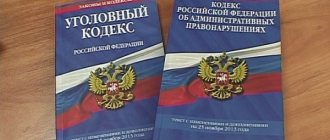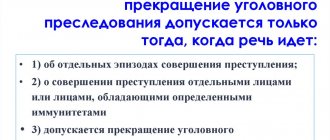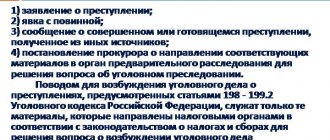1. An inquiry officer or investigator has the right to separate another criminal case from a criminal case into separate proceedings in relation to: 1) individual suspects or accused in criminal cases of crimes committed in complicity, in the cases specified in paragraphs 1-4 of part one of Article 208 of this Code ; 2) a minor suspect or accused brought to criminal liability along with adult accused; 3) other persons suspected or accused of committing a crime not related to the acts charged in the criminal case under investigation, when this becomes known during the preliminary investigation; 4) a suspect or accused with whom the prosecutor has entered into a pre-trial cooperation agreement. In the event of a threat to the safety of the suspect or accused, the materials of the criminal case identifying his identity are withdrawn from the criminal case initiated and added to the criminal case against the suspect or accused, separated into separate proceedings; 5) individual suspects in respect of whom the preliminary investigation is carried out in the manner established by Chapter 32.1 of this Code, if in relation to other suspects or accused the preliminary investigation is carried out in accordance with the general procedure.
2. Separation of a criminal case into a separate proceeding to complete the preliminary investigation is permitted if this does not affect the comprehensiveness and objectivity of the preliminary investigation and resolution of the criminal case, in cases where this is caused by the large volume of the criminal case or the multiplicity of its episodes.
3. The separation of a criminal case is carried out on the basis of a decision of the investigator or inquiry officer. If a criminal case is separated into separate proceedings for the purpose of conducting a preliminary investigation of a new crime or against a new person, then the resolution must contain a decision to initiate a criminal case in the manner prescribed by Article 146 of this Code.
4. A criminal case separated into separate proceedings must contain originals or copies of procedural documents relevant to this criminal case certified by the investigator or inquiry officer.
5. Materials from a criminal case separated into separate proceedings are admitted as evidence in this criminal case.
6. The period of preliminary investigation in a criminal case separated into separate proceedings is calculated from the date of the relevant decision, when a criminal case is separated for a new crime or against a new person. In other cases, the period is calculated from the moment of initiation of the criminal case from which it was separated into separate proceedings.
Characteristics of the concept
The separation of a case into a separate proceeding is the withdrawal of part of the materials from the main proceeding, as an independent criminal proceeding. This mechanism is regulated by Art. 154 Code of Criminal Procedure of the Russian Federation. The purpose of this procedure is to concentrate the attention of law enforcement agencies on a specific subject of the offense and a specific act committed by him. Article 154 of the Code of Criminal Procedure of the Russian Federation sets a kind of framework and conditions that create the prerequisites for isolating an episode from the general proceedings; in addition, the content of Article 154 of the Code of Criminal Procedure of the Russian Federation provides a description of the reasons necessary for issuing such a procedural document.
Most theorists argue that the main condition for distinguishing criminal proceedings should be the absence of points of contact between the acts and the subjects of the accusation. In simple terms, we can talk about the existence of grounds for separation when, during the pre-trial investigation, the goal-setting principles for connecting the episodes are not determined.
The separation procedure ensures objectivity prior to judicial investigation by individualizing the facts and certain categories of persons, increases the speed of the investigation and the ability to continue or complete the investigation despite obstacles. According to Article 154 of the Code of Criminal Procedure of the Russian Federation, the separation of a criminal case is allowed against the accused, but as an exception it provides for the separation in relation to suspects, for example, this is noted in situations where there is no accused in the case, but there is a suspect.
Case department
Isolating a criminal case is a mirror technique regarding connection!
The main purpose of highlighting is the concentration of law enforcement officers on one specific act. The allocation is made to comply with the basic constitutional rules of justice. In this case, the preset criteria must be met and maintained. It is about inclusiveness and complete impartiality.
To carry out such a separation of proceedings into one, two grounds must be met:
- Procedural. Linking the material component in executed papers.
- Material. The list of aspects of this act is prescribed in Art. 154 Code of Criminal Procedure.
If the case being separated directly concerns a new citizen or action, a new case is immediately initiated along with the decision to separate the production process. The opening is carried out according to Art. 146 Code of Criminal Procedure. If citizens or circumstances appear in the collected cases, the investigation period begins to be calculated from the date of the official decision to start one proceeding.
Reasons for allocation
The Criminal Code defines the grounds for issuing a new criminal case; they can be divided into grounds in relation to certain subjects of the offense and in relation to the crime. To identify a separate case in relation to the subjects, it is necessary:
The procedure and timing for separating criminal case materials into separate proceedings under the Code of Criminal Procedure of the Russian Federation, Article 155
- the presence of grounds for suspending the criminal case in relation to some identified accomplices;
- the age of the accused (less than 18 years old) who was prosecuted for committing criminal acts together with adults;
- absence of interrelation between the actions of persons not related to violations that are charged as guilt in the case under investigation by suspects or accused of committing crimes. For example, a criminal investigation was initiated into arson; during the investigation it was established that those suspected of committing this violation had previously committed thefts and assaults;
- refusal of the accused to consider his case by a jury, in the presence of a request from other accused to consider the same case with their participation;
- the insanity of one of the accomplices in the offense or the onset of a mental disorder as a result of the crime committed (Article 436 of the Code of Criminal Procedure of the Russian Federation);
- objections of the accused, who are not military personnel, to the consideration of their case by a military court (the situation happens when a military court deals with the rest of the accused for a specific crime).
It is established law that the division of criminal proceedings must be carried out in such a way as to ensure that impartiality and comprehensiveness are not compromised.
Separation is always a forced and undesirable measure, because it has a negative impact on the comprehensiveness of the investigation. Although the circumstances of the separated proceedings are in an inverse relationship, and can serve as evidence in both processes.
It should be noted that ongoing criminal proceedings can be divided into several proceedings in relation to group crimes if:
- one of the accomplices is not sane;
- one of the accomplices or several of them is hiding from the investigation;
- the location of the accused is known, but there is no possibility of bringing them to real responsibility;
- one of the accomplices has not been identified.
If one of the accomplices cooperates in every possible way with the investigation to ensure his safety and for the purpose of an objective assessment of his actions, he will be provided with a separate accompaniment for the crime committed together with other accomplices. If the accused admits his guilt, and the other defendants in the case are silent, a simplified inquiry will be conducted against him and, again, his activities will be separated from the general proceedings.
Quite interesting is the situation in which the victim was seriously injured during a robbery. A specific accused was brought to justice, but during the investigation it was established that he did not act alone and there were also accomplices in the crime. In this case, proceedings will be initiated against them separately. If the robbery was carried out by a group of unknown persons, then the identification of each accomplice does not require a new proceeding; all of them will be involved in one criminal case.
Resolution on separating criminal case materials into separate proceedings
The basis for separating proceedings in relation to crimes is the need to terminate the investigation of certain episodes or in relation to individual accused. Now we are talking about a situation in which certain episodes of the offense have already been fully investigated, but others have not. In order to avoid delays in the investigation, the “finished” part of the proceedings can be allocated for sending to court, as a separate criminal proceeding.
Criminal proceedings may also be allocated to investigate a new crime that was committed by the same persons, or in relation to a different victim. An example of a situation would be the consideration of a rape case, during the investigation of which the accused also confessed to burglary. New proceedings will be initiated if the owner of the apartment and the victim of rape are not connected in any way. If rape was committed during the burglary, a new charge will not be issued.
Procedure for separating a case
The process, which is separated into a separate proceeding, must contain the originals of procedural documents (if they are not essential for the main proceeding) or their notarized copies. In the main case, when separating separate proceedings, copies of the resolution on separating the episodes into separate proceedings remain. The same expert assessments, protocols and material evidence can be involved in both proceedings in the form of certified copies and originals.
If the episode was identified for a new offense or in relation to another person, the period of preliminary investigation on it begins to be calculated from the moment the orphaned decision is issued. In all other cases, the investigation period is calculated from the date of initiation of the main proceedings. The period of detention of accused or suspects is calculated in the manner established by Article 109 of the Code of Criminal Procedure of the Russian Federation.
In order for the case materials to be separated into separate proceedings, a resolution is issued, which, together with all other materials, is sent by investigators to the head of the investigative body, and by investigators - to the prosecutor in the form of grounds for initiating a case. The prosecutor initiates an investigation in accordance with Art. 144 of the Code of Criminal Procedure of the Russian Federation and makes a decision on the initiation or refusal of new criminal proceedings.
To summarize, we can say that the separation of a case during a pre-trial investigation or in court is rarely subject to appeal, since the legal and factual grounds for this procedure are clear to all participants in the investigation and judicial proceedings. In judicial practice, there are not uncommon complaints about the inconsistency in the Constitution of the Russian Federation with the provisions of criminal procedural legislation in terms of separating a case, but the majority of such complaints do not meet the criteria for the admissibility of consideration of cases by the Constitutional Court, and accordingly are not accepted at all.
Connecting cases
The theory of modern criminal law regards the consolidation of proceedings into one to expand the overall scope of proceedings. In this case, the principle of multiplicity of actions and multi-subjectivity is taken into account.
Consolidation of proceedings always has an important procedural and substantive aspect at its core!
All possible material components are indicated in the disposition of Art. 153 Code of Criminal Procedure. Here are the grounds for combining cases into one special proceeding:
- The presence of previously opened proceedings and proceedings in relation to one specific entity. Proof of authorship is important.
- Committing several violations at once by one person. In such a case, the proceedings are combined into a single case. The time and organizations that conducted the investigations do not matter here. The merger is carried out according to the principle of the plurality of actions carried out.
- Complicity, like concealment, which was not promised in advance.
- The commission of crimes of equal nature and gravity by a group of persons. In this case, not several cases are being investigated against one violator, but one case committed by several persons. In such a case, the connection is made according to the principle of a circle of persons.
The main material aspect is objectively prescribed in a special way in non-normative acts drawn up by the prosecutor or the head of the investigative case. Employees prepare documents. It is these papers that are considered a procedural aspect in the standard consolidation of cases.
When connecting, the duration of the investigation is taken into account. The duration of the investigation matters. The countdown begins on the date of initiation of the first case from the mass of the combined ones.
Commentary to Art. 155 of the Criminal Procedure Code of the Russian Federation
Comments on the articles of the Code of Criminal Procedure will help you understand the nuances of criminal procedure law.
1. Identification during the preliminary investigation of information about the possible commission of a crime that is not related to the crime under investigation and does not allow a decision to initiate a criminal case to be made, entails the separation of materials containing the specified information into a separate proceeding and sending them to the prosecutor for subsequent verification.
2. Materials isolated from a criminal case imply the possibility of making a decision on them, after additional study and clarification of the available information, both to initiate a criminal case and to refuse to initiate a criminal case or to forward materials on jurisdiction or jurisdiction.
3. Proceedings based on materials isolated from a criminal case in accordance with the provisions of the commented article are carried out in the order of considering a report of a crime (see commentary to Article 144).
4. A resolution is issued on the separation of criminal case materials into a separate (verification) proceeding that meets the requirements for a resolution on the separation of a criminal case (see commentary to Article 154).
5. If a new criminal case is initiated based on materials containing information about a new crime and separated from a criminal case, these materials may be used in this criminal case as evidence, provided that they comply with the requirements of Chapter. 10 Code of Criminal Procedure.
Consequences for the suspect (accused)
Participants in the process often have questions about what changes may occur and whether their position will worsen or improve in connection with the start of a separate audit.
It is important to understand that the procedure does not have an accusatory bias and is carried out for the sole purpose: a high-quality and comprehensive investigation. Need to know:
- the period of investigation into an already initiated case does not increase;
- the selected documents continue to retain the status of evidence.
Actions in accordance with Article 155 of the Criminal Procedure Code of the Russian Federation are taken in relation to facts that are not directly related to the suspect (accused) and cannot worsen the latter’s position, unless during the inspection facts of his involvement in the commission of other crimes are revealed.
Arbitrage practice
The possibility of isolating materials has existed in domestic investigative practice for quite some time.
However, many legal theorists agree that such an event cannot be called correct. The fact is that the need to separate materials indicates that there are shortcomings and ramifications in the case, which is unacceptable for a proper investigation. Judicial practice of applying the procedural action in question concerns the subsequent rendering by the court of a verdict on charges of subjects as a result of the separation of materials. As a rule, the selection of materials is not an obstacle to finding the subject appearing in the materials guilty. This process only makes it possible to reduce the sentence and bring to justice offenders who remained unknown for a certain time.






